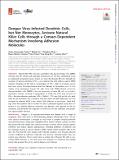| dc.contributor.author | Costa, Vivian Vasconcelos | |
| dc.contributor.author | Ye, Weijian | |
| dc.contributor.author | Chen, Qingfeng | |
| dc.contributor.author | Teixeira, Mauro Martins | |
| dc.contributor.author | Preiser, Peter | |
| dc.contributor.author | Ooi, Eng Eong | |
| dc.contributor.author | Chen, Jianzhu | |
| dc.date.accessioned | 2017-08-18T13:48:38Z | |
| dc.date.available | 2017-08-18T13:48:38Z | |
| dc.date.issued | 2017-08 | |
| dc.date.submitted | 2017-05 | |
| dc.identifier.issn | 2150-7511 | |
| dc.identifier.uri | http://hdl.handle.net/1721.1/110972 | |
| dc.description.abstract | Natural killer (NK) cells play a protective role against dengue virus (DENV) infection, but the cellular and molecular mechanisms are not fully understood. Using an optimized humanized mouse model, we show that human NK cells, through the secretion of gamma interferon (IFN-γ), are critical in the early defense against DENV infection. Depletion of NK cells or neutralization of IFN-γ leads to increased viremia and more severe thrombocytopenia and liver damage in humanized mice. In vitro studies using autologous human NK cells show that DENV-infected monocyte-derived dendritic cells (MDDCs), but not monocytes, activate NK cells in a contact-dependent manner, resulting in upregulation of CD69 and CD25 and secretion of IFN-γ. Blocking adhesion molecules (LFA-1, DNAM-1, CD2, and 2β4) on NK cells abolishes NK cell activation, IFN-γ secretion, and the control of DENV replication. NK cells activated by infected MDDCs also inhibit DENV infection in monocytes. These findings show the essential role of human NK cells in protection against acute DENV infection in vivo, identify adhesion molecules and dendritic cells required for NK cell activation, and delineate the sequence of events for NK cell activation and protection against DENV infection.IMPORTANCE Dengue is a mosquito-transmitted viral disease with a range of symptoms, from mild fever to life-threatening dengue hemorrhagic fever. The diverse disease manifestation is thought to result from a complex interplay between viral and host factors. Using mice engrafted with a human immune system, we show that human NK cells inhibit virus infection through secretion of the cytokine gamma interferon and reduce disease pathogenesis, including depletion of platelets and liver damage. During a natural infection, DENV initially infects dendritic cells in the skin. We find that NK cells interact with infected dendritic cells through physical contact mediated by adhesion molecules and become activated before they can control virus infection. These results show a critical role of human NK cells in controlling DENV infection in vivo and reveal the sequence of molecular and cellular events that activate NK cells to control dengue virus infection. | en_US |
| dc.publisher | American Society for Microbiology | en_US |
| dc.relation.isversionof | http://dx.doi.org/10.1128/mBio.00741-17 | en_US |
| dc.rights | Creative Commons Attribution-NonCommercial 4.0 | en_US |
| dc.rights.uri | https://creativecommons.org/licenses/by/4.0/ | en_US |
| dc.source | mBio | en_US |
| dc.title | Dengue Virus-Infected Dendritic Cells, but Not Monocytes, Activate Natural Killer Cells through a Contact-Dependent Mechanism Involving Adhesion Molecules | en_US |
| dc.type | Article | en_US |
| dc.identifier.citation | Costa, Vivian Vasconcelos et al. “Dengue Virus-Infected Dendritic Cells, but Not Monocytes, Activate Natural Killer Cells through a Contact-Dependent Mechanism Involving Adhesion Molecules.” Edited by Peter Palese. mBio 8, 4 (August 2017): e00741–17 © 2017 Costa et al | en_US |
| dc.contributor.department | Massachusetts Institute of Technology. Department of Biology | en_US |
| dc.contributor.department | Koch Institute for Integrative Cancer Research at MIT | en_US |
| dc.contributor.mitauthor | Chen, Jianzhu | |
| dc.relation.journal | mBio | en_US |
| dc.eprint.version | Final published version | en_US |
| dc.type.uri | http://purl.org/eprint/type/JournalArticle | en_US |
| eprint.status | http://purl.org/eprint/status/PeerReviewed | en_US |
| dc.date.updated | 2017-08-17T19:21:48Z | |
| dspace.orderedauthors | Costa, Vivian Vasconcelos; Ye, Weijian; Chen, Qingfeng; Teixeira, Mauro Martins; Preiser, Peter; Ooi, Eng Eong; Chen, Jianzhu | en_US |
| dspace.embargo.terms | N | en_US |
| dc.identifier.orcid | https://orcid.org/0000-0002-5687-6154 | |
| mit.license | PUBLISHER_CC | en_US |
